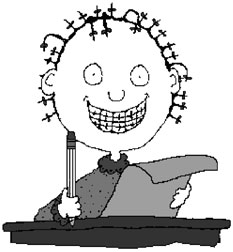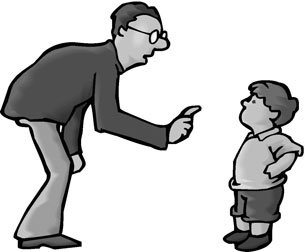|
Discussing and debating the best mode:
Children’s discipline
by Ashley Weerasooriya
 The words were few and simple, but they meant so much, they were the
letters of love, sadness and memories Ramya wrote to her children. They
will have to last a lifetime. When Ramya picked up her pen to commit her
thoughts and feelings to paper, she knew that by the time her children
were old enough to read them, she would be dead. The words were few and simple, but they meant so much, they were the
letters of love, sadness and memories Ramya wrote to her children. They
will have to last a lifetime. When Ramya picked up her pen to commit her
thoughts and feelings to paper, she knew that by the time her children
were old enough to read them, she would be dead.
She set about writing her letters to her children, one each, to be
opened when they are old enough to fully appreciate everything their
loving mother wanted to say before she died of breast cancer. She saw
the exclamation of sorrow and warning sound, the end is near and nothing
could be done except to get ready for her funeral.
Those were the inspiring love and courage of a mother.
As human beings we all love our children.
It does not matter whether they are born with sicknesses or
imperfections.
Among children there are aggressive and timid, shy and forward, bold
and backward, friendly and unfriendly, well mannered and rude children.
Therefore they are not all the same.
Most children love their mother and father in a special way. That
love is not comparable with any other love he or she may have towards
someone else later in life.
When major changes around their lives obstructed or challenged to
disturb that established mentality and their upbringing such children
find it hard and difficult to adjust to the unexpected harsh realities
in life. Although they bear it up it is always there; for them to
contemplate even during their educational periods.
 Children are an essential part of a family. Children are an essential part of a family.
As years go by, a couple can lose sight of each other due to various
reasons. The love seems to go, and children are the ‘glue’ that binds
the relationship, although this is a small percentage. Sometimes parents
influence on a marriage is not fully realized by children until they are
big enough to understand.
When the time comes for the children to leave home, some couples
believe there’s nothing to keep them together anymore, then again this
is a small percentage.
Parents should never argue in front of their children and never draw
children into conflicts and force them to take sides. Or talk to
insinuate wrong opinions against one person to the other. Parents should
refrain from inserting craftily made gradual harmful effects on
children. In case a family breaks up for other reasons let your children
know it is not their fault and that you still love them, don’t let them
blame themselves. Tell your children about any separation as soon as
possible; never believe they don’t know what’s going on. Children do
understand what’s going on. They even pick up on voice, facial
expressions and atmosphere in the house.
Children may have trouble sleeping at night because they fear that
one of their favourite teachers may join another school.
Ambitions
Are your children coping?
Whilst these are not professional advice, some warning signs to watch
would be: Irritability, anger or aggression; being quiet or withdrawn,
loosing interest in friends, acting up in school, depression or low
esteem, sleeplessness, complain about head or stomach aches.
Discipline and influence on children by parents are the most
important in their young lives together with their education.
Children get their share of pride mostly out of their cleverness and
quick at learning and understanding things in life. A child may not be
clever at studies but then he or she could be showing skills in using
his cleverness in other fields, such as technical or communication
fields. Such talents should be observed early without disturbing
education and lead them to further their ambitions in their chosen
fields.
During the last few weeks there had been certain assumptions and
wrong opinions expressed on this subject that children’s strong
attachment would be where they received their education from.
But this is completely wrong.
It may be applied to some, but not for the majority of this country.
Therefore the most important point in this regard that the bonding of
children with each of its natural parents are so greater, than any
issues, including the above, or those issues that may not have been
resolved as yet.
This is where the influence and discipline of the parents come into.
Once the student finds some difficulties in an institution where the
education is received, it needs to be brought to the attention of the
parents concerned which is the fundamental duty. It is not that parents
are poking their fingers at educational matters but because the parents
are the natural guardians of children and are naturally vested with
powers which the law accepts as deemed right.
In the case of educationists they have a difficult job, but there
again any punishment within the accepted customs cannot be delegated to
a student leader.
Under care
As such who could judge the punishment conformed in accordance with
the offence committed?
Once the offence is established the idea is to make an offender NOT
to suffer for the offence unless a murder or careless accident caused
lot of damage, in which case a penalty could be sufficient. It is
therefore highly unlikely students commit offences that needs only
punitive actions, therefore such actions are rare and reluctant to
impose on students and they can only be implemented by authorized
persons and not student leaders etc.
The time that children spend during studying hours at educational
institutions can be defined that they are under the care of that
institutional guardian care. In addition to providing education, the
guardian has a general responsibility towards religious up bringing as
well as the physical and moral welfare of the child in matters which go
beyond its daily care and control.
An important issue such a this , had been the subject of discussions
during the last few weeks in Sri Lanka, perhaps reported around the
world, a subject that is close to our conscience.
Have we kept our intentional mental faculties awake or not?
As parents have we paid careful attention towards our children and
had an unbiased opinion?
Or have we believed in ‘foisted’ opinions which mean inferior beliefs
and putting the blame elsewhere?
Have we become so primitive in our beliefs? Hope not.
In countries with largely developed organized communities, debating
and discussing issues related to children are a common thing. No one
gets upset.
In fact these discussions are not only represented by psychologists
but also parents and those educationists who are responsible for that
particular incident; this procedure has become not only workable and
successful but also it has become a weapon against failures and
unsuccessful functions, if any in those situations. We are only voicing
our opinions about our children. Often people say ‘you are entitled to
your opinion’, and respect it.
Vicious circle
Parents of children stay as the paramount owners at all times, those
powers of the parents are not specifically deducted during the period
the student spends time at educational institutions.
Every country in the world regard the welfare of the children are the
paramount consideration, an overriding consideration.
Any other factor such as the conduct of the parents towards each
other can be relevant in so far as it bears on the welfare of the
children. In the case of children who are still learning, although
discipline is contemplated where necessary, it has to have certain
limitations.
The learning curves and the branches of learning has to be free from
any tension or fear and learning should be conducted in a free and
friendly atmosphere, for instance a child may have a ‘broken home’ and
unpleasant place to go after school, but he or she might enjoy being at
school and enjoy life much better than being at home.
No doubt it is fair to say there are many thousand ‘innocent
children’ trapped in this so called vicious circle where voices cannot
be heard or looked at.
Now we have more time in our hands and no excuses can be given, to
devote more time to lift the standards of our children. While we search
for new information on new discoveries in the educational sector, we
should cooperate with good efforts of majority educationists and
strengthen their hands.
The Government, the Department of Education should be congratulated
for their support to uplift the standard of teaching English language in
this country but they have to forget teaching English in our mother
tongue, English should be taught in English. The importance of learning
English is an enormous subject to discuss, therefore it should be
sufficient to say that no one could live without knowing this global
language such as English language, which is the language of the world.
Now that the Government is busy on promoting the learning of the
English language to improve our children’s prospects specially in rural
areas of SL, chances of our present generation participating in a ‘big
way’ seems not too distant.
Sri Lanka’s pursuit as she march forward with new dynamism to teach
and learn English appear to be like studying the present educational
situations well to estimate future successs. |

